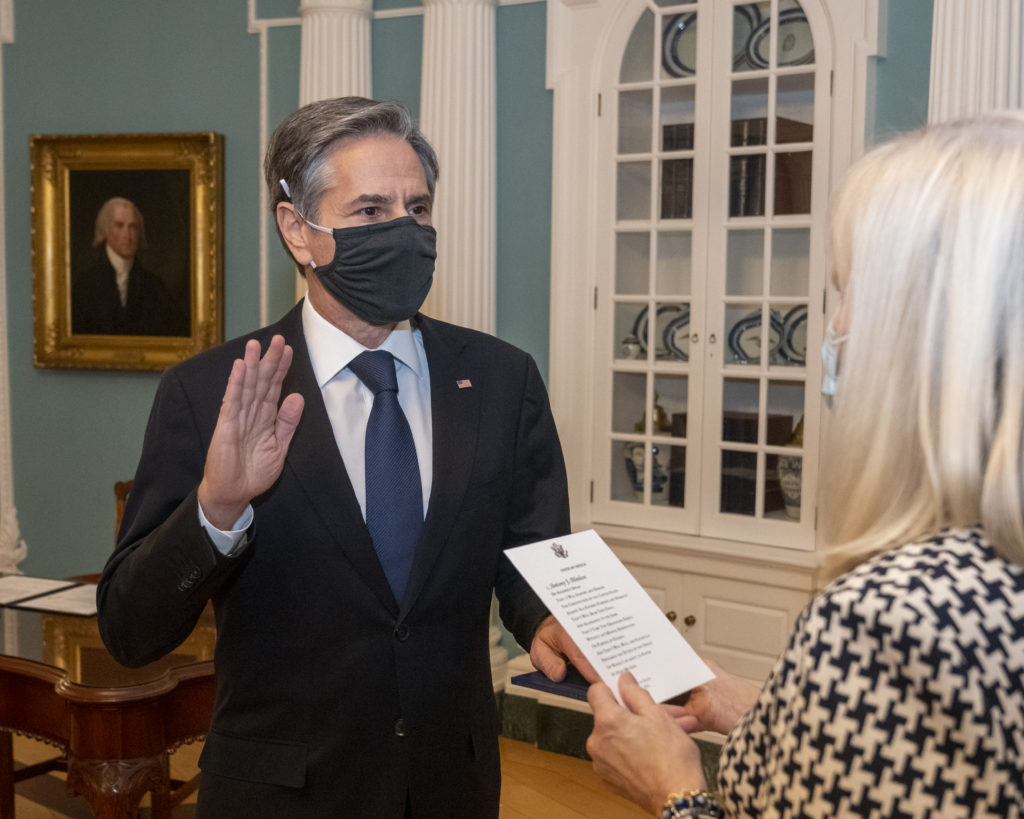
The new administration of United States President Joe Biden has so far generally kept quiet on their Middle East peace plans, but that may change in the not too distant future. US State Department spokesperson Ned Price, while reiterating the Biden Administration’s support for the Abraham Accords diplomatic normalization process, hinted last Thursday that some type of public discourse on Israel-Arab relations could be forthcoming.
After stating that the US has had discussions on the normalization process with Arab and Muslim partners in a “bilateral context”, as well as with the Israelis, Price said, “I wouldn’t want to get ahead of private conversations at this point, but I expect before too long, we’ll be in a position to say more and you’ll be in a position to see more about how we are going to build on that.”
Price’s comments, published in a State Department press release, were in response to a reporter’s question highlighting support from US Secretary of State Anthony Blinken for the Abraham Accords process that has seen Israel sign normalization agreements with the United Arab Emirates (UAE), Bahrain, Sudan and Morocco. Price refused to address whether or not normalization between Israel and Saudi Arabia was being discussed.
Price did say that they “support the normalization agreements between Israel and countries in the Arab and the broader Muslim world. It is something that we will seek to build on. It is something that we have welcomed from the previous administration and something, again, we will seek to build on going forward.”
The lack of American details on their Middle East peace approach comes as France and Germany, in a joint statement with Egypt and Jordan, reiterated their commitment to the two-state solution approach to the Israel-Palestinian conflict. Despite that land-for-peace tactic failing to produce a peace deal between the sides in more than three decades of work—and the Trump Administration mediating four Israel-Arab peace deals without a Palestinian accord—the joint statement claimed that the two-state solution is “indispensable for comprehensive peace in the region.”
The press statement, released by the German Federal Foreign Office, said the Ministers of Foreign Affairs from the two European and two Arab nations gathered in Paris last Thursday for a meeting to discuss efforts to contribute to a “conducive environment for a resumed dialogue” between Israel and the Palestinians. The Palestinians broke off peace talks with Israel years ago and have refused to participate in the Abraham Accords process.
The European-Arab joint statement called for a two-state solution to be based on the 1967 armistice lines, which effectively gives the Biblical heartland of Judea and Samaria to the Palestinians, along with half of Jerusalem. The latest meeting in Paris was the four countries’ fourth in just over a year, with no discernable progress towards the desired “confidence-building measures” by Israel and the Palestinians that could realistically lead to resumed peace talks.
Egypt and Jordan historically were the only two Arab nations who had peace with Israel, but the Abraham Accords tripled the number of Arab nations holding diplomatic relations with Israel. Recently, a diplomatic dispute between Israel and Jordan resulted in “difficulties” regarding the use of its airspace for Israeli Prime Minister Benjamin Netanyahu to visit the UAE as part of that broader normalization process.
A press release from Netanyahu’s office said the difficulties “apparently stemmed from the cancellation of the Jordanian Crown Prince’s visit to the Temple Mount due to a disagreement over security procedures at the site,” while noting that Jordan later announced too late that it would permit the use of Jordanian airspace. Netanyahu’s office said they and the UAE have agreed to reschedule the visit to the UAE.
Netanyahu, in a separate press release from his office, clarified that the visit to the UAE “was not possible due to misunderstanding and difficulties in coordinating our flights that stemmed from an incident that happened yesterday on the Temple Mount. It took us several good hours to straighten things out with Jordan. We could have flown, I can fly over Jordan, but until this coordination was achieved, the visit was not possible.”
On the other hand, while diplomatic problems were occurring between Israel and Jordan—a partner in that European-Arab effort to try and nudge along Middle East peace—the UAE made more progress in relations with Israel during a call last week between Netanyahu and UAE ruler Sheikh Mohammed bin Zayed.
Said Netanyahu in the press release, “We agreed on three things: First, that we will have an additional visit very soon. Second, we will move forward on the green passport between Israel and the UAE. Third, and this is very important news for the citizens of Israel, the UAE intends to invest, by various methods, the vast sum of $10 billion—almost NIS 40 billion—in various projects.”
So while the US is quiet on details for new plans and the Europeans are pursuing old ones, last year’s Israel-Arab peace deals continue to produce results.
(By Joshua Spurlock, www.themideastupdate.com, March 14, 2021)
